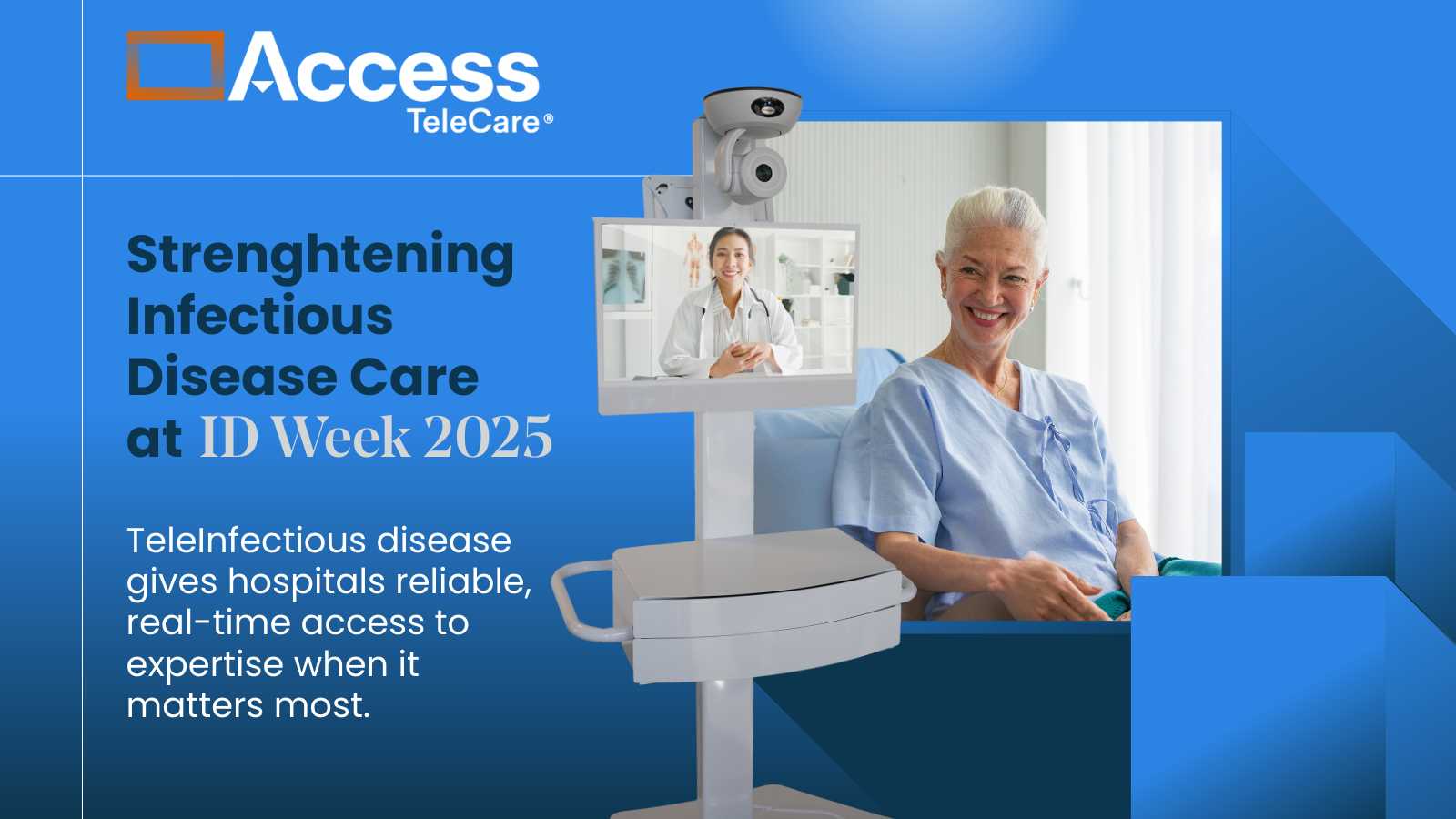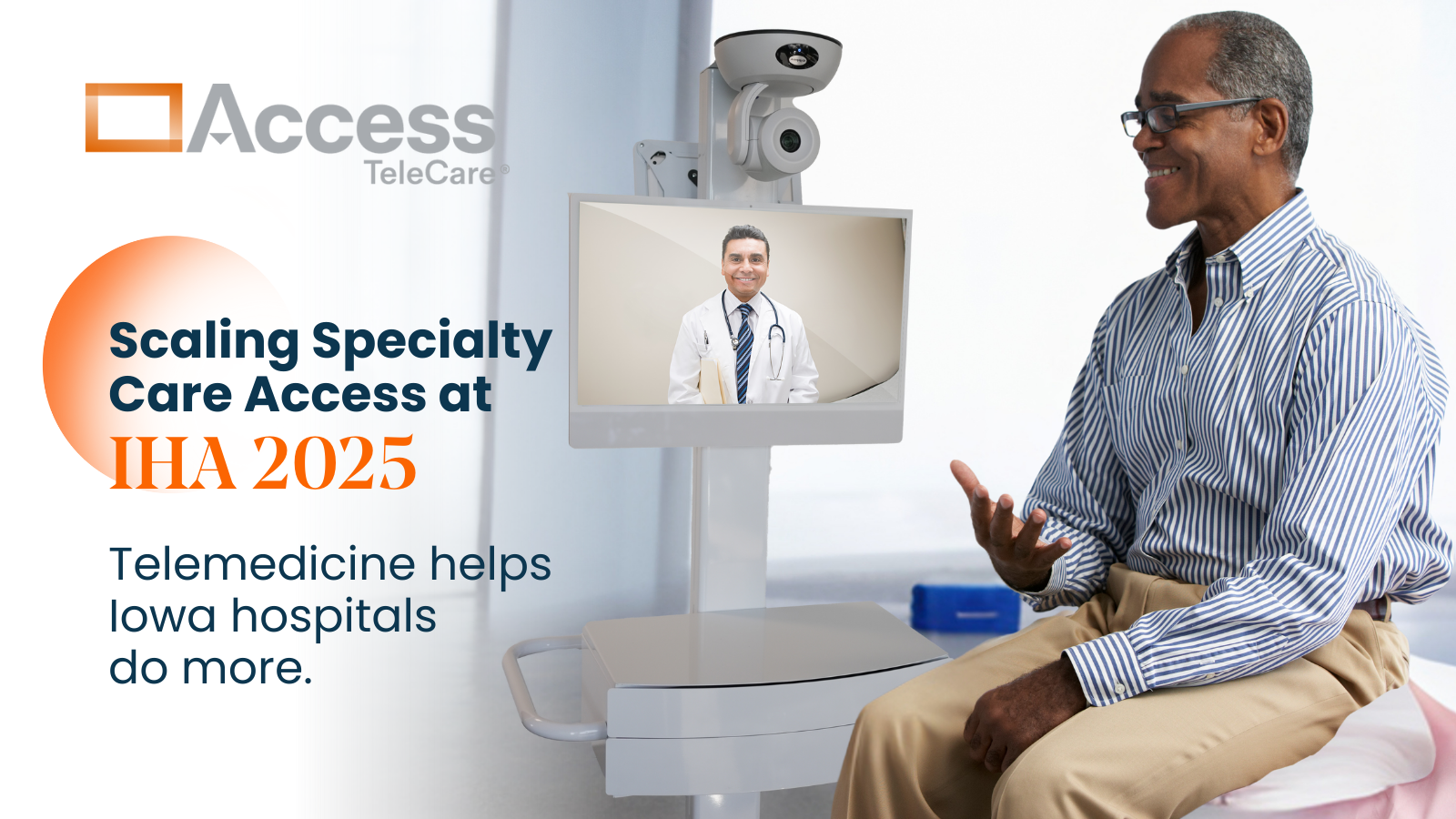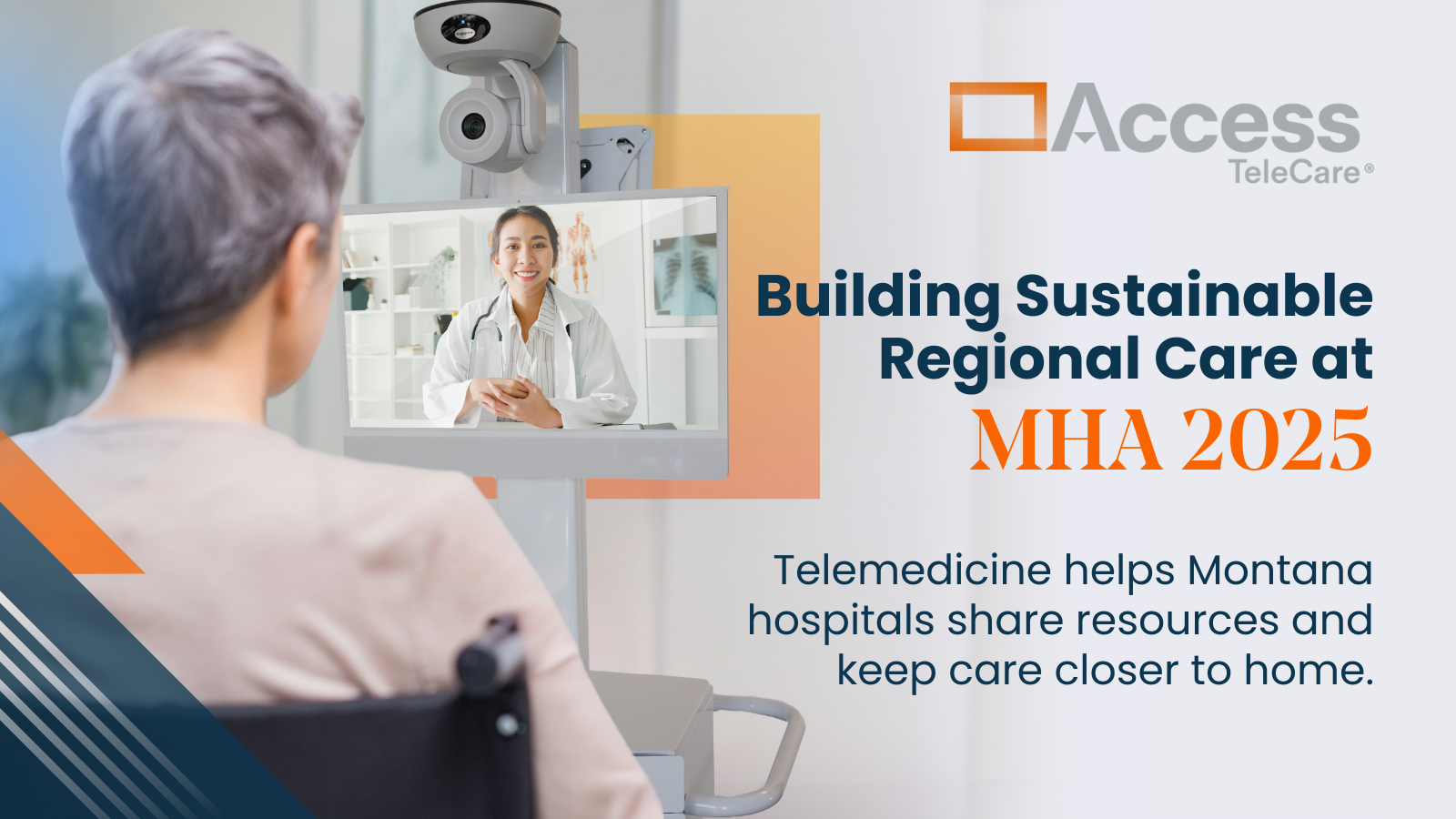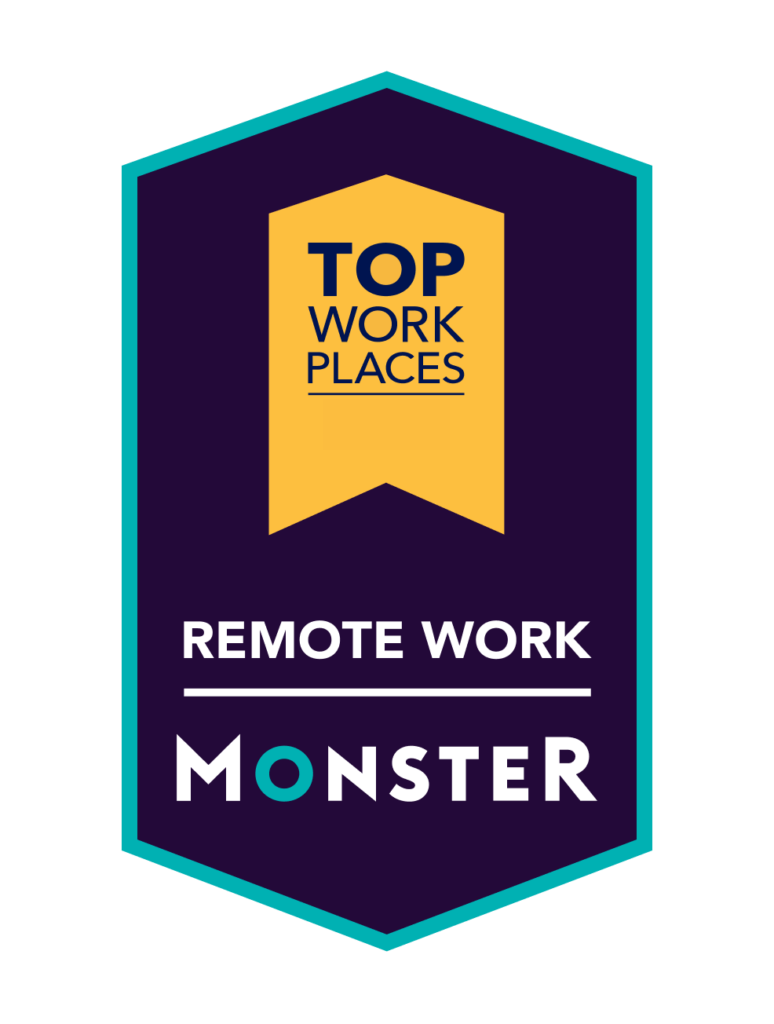Our 2021 Access TeleCare blog focused on the status of the acute telemedicine practice in the era of COVID-19 and beyond. Access TeleCare physicians and partners offered their expertise and advice throughout the year. Let’s take a look back…
Key Trends and Insights in Acute Telemedicine in 2021
2021 Will Be The Year Telemedicine Loses The “Tele”
Dr. Jason Hallock, Chief Medical Officer at Access TeleCare, discusses his four predictions for what 2021 will bring for the telemedicine practice, including opportunities for reimbursement, a new generation of multimodal platforms, and an increase in diversity of providers.
TeleNeurology Offers Real-Time Clinician Collaboration
How can a telemedicine career foster collaboration and collegiality? Dr. Susanna Horvath, teleNeurologist at Access TeleCare, learned that she was able to effectively communicate with her colleagues to provide life-saving care to patients even though the collaboration was virtual.
How TelePsychiatry Helps Hospitals Alleviate Psychiatrist Shortages
Mauricio Sirvent, Executive Vice President, Care and Delivery, Neurology and Psychiatry at Access TeleCare, dives into the psychiatrist shortage and mental health surges that many hospitals are currently seeing. He explains why adopting a telePsychiatry program can help hospital systems to quickly and accurately determine the correct approach to care for a patient whether in the emergency room setting or the inpatient setting.
Why Telemedicine Careers For Physicians Are Becoming More Popular
The pandemic brought telemedicine into the homes and practices of millions of Americans and accelerated the rate of adoption for both patients and physicians. Clark Wells, Director of Physician Recruiting at Access TeleCare, discusses a shift in physicians’ perception that has opened their minds to full-time telemedicine careers.
Successful Proning Via TeleICU: Coaching A Care Team Requires Communication
The process of turning over a patient is not complicated. But it is still risky. Dr. David Fedor, teleCritical Care Physician at Access TeleCare, explains the importance of proning patients and how this practice can be taught successfully even through teleICU.
Telemedicine Cybersecurity: Lessons From HITRUST Certification
As patient visits transitioned from in-person to virtual during the pandemic, telemedicine cybersecurity became a top concern for many hospitals. Read more about why healthcare organizations should rely on HTIRUST certification to confirm that their partners have implemented administrative, operational, and technical controls for telemedicine cybersecurity.
How To Choose A TelePsychiatry Partner
Many hospitals have tapped telePsychiatry services to assist the delivery of psychiatric evaluations and alleviate overcrowding in the emergency department, reduce Length-of-Stay (LOS) for patients, or augment inpatient coverage as may be needed by hospitals. This blog lays out the five critical areas to consider when choosing a telePsychiatry partner.
How TeleICU Solves The Challenge Of Cost-Effective ICU Staffing
The challenge of cost-effective ICU staffing is easy to sum up yet difficult to address. This blog speaks to the different models for confronting this challenge as telemedicine continues to expand into more acute care settings.
TelePsychiatry Rising To Meet Mental Health Surge
At the start of the pandemic, some facilities shut down observation units and stopped in-person visits to clinics to reduce the risk of infection. This meant losing a place where behavioral health patients could wait for short-term stabilization and opportunities to see their doctor—and with those changes, treatment dropped off as well. Dr. John Kenny, Chief of Psychiatry at Access TeleCare, discusses the ways in which telePsychiatry rose to meet this surge in mental health patients, helping hospitals manage capacity without contributing to clinician burnout.
Telemedicine For Mental Health During The Pandemic
Traci Richards, Ph. D., Manager of Behavioral Health Services at Chesapeake Regional Healthcare, shares how her hospital system utilizes telePsychiatry to address the mental health needs in the community during the pandemic and beyond.
How Telemedicine Can Help Prepare For The Next Pandemic
Hospitals were not prepared for the COVID-19 pandemic. As hospital systems continue to learn more about the benefits of telemedicine, Mauricio Sirvent, Executive Vice President, Care and Delivery, Neurology and Psychiatry at Access TeleCare, provides insight into why adopting telemedicine can be an asset to fight COVID-19 as well as future pandemics.
Dramatic Telehealth Growth During COVID Driven By Mental Health Surge
Data tracking the use of telehealth resources in the U.S. from January 2019 through December 2020 showed clear results: the behavioral and mental health surge was bordering on astronomical. This blog dives into the data and how telePsychiatry can provide the necessary virtual surge when and where it’s needed.
How TelePsychiatry Can Help Assertive Community Treatment Programs
Assertive Community Treatment (ACT) Programs are comprehensive, community-based models for tracking and proactively monitoring people with severe mental illness. But ACT programs are facing the same problem as the mental and behavioral health system as a whole: a shortage of psychiatrists. TelePsychiatry provides a crucial, missing link in our country’s mental healthcare infrastructure by providing more psychiatrists to more patients around the country.
Telemedicine’s Two Separate—And Different—Worlds For Hospitals
There are two different telemedicine spaces: acute care and everything else. As hospital leaders seek to consolidate dozens of telemedicine vendors down to a handful, thinking about those two worlds as separate entities should help drive the decision-making. Learn more from Dr. Jason Hallock, Chief Medical Officer at Access TeleCare, as he deciphers between these different areas of telemedicine.
ICU Statistics During COVID Drove Pandemic Response
The entirety of the U.S. pandemic response came down to ICU statistics. This blog outlines the ICU capacity statistics before and after the pandemic while also outlining the lessons learned to implement a successful ICU staffing strategy in the future, one that should be able to scale up or down when necessary.
10 Lessons Learned After Over A Million Telemedicine Consults
SOC’s physicians, hospital partners, Consult Coordination Center, and quality team all provided feedback that helped us improve our services and solutions. Here, find our 10 lessons learned and advice to hospitals and health systems after more than a million telemedicine consults.
Bunker Model Vs. TeleICU: A Comparison
Hospitals faced with challenges in ICU staffing often compare two virtual options: bunker model vs. teleICU. What are the differences between the bunker model and teleICU, and how should hospitals compare them depending on use cases? This blog addresses the many factors that hospitals should consider when choosing one over the other.
How TeleMaternal-Fetal Medicine Specialists Support Mothers, Babies, And Hospitals
Dr. Sina Haeri, Chief Clinical Strategy Officer at Access TeleCare, shares his latest research project and explains how teleMaternal-Fetal Medicine (teleMFM) specialists support mothers, babies, and hospitals.
How TeleNeurology Provides Expertise For Epilepsy, MS, Movement Disorders, And Dementia Patients
Dr. Eric Anderson, Director of Scientific Affairs, Director of Epilepsy, explains why adopting a teleNeurology program in your hospital is a win-win for the patients and physicians. The patients connect with the most experienced clinician when they need it, and the neurologists gain much more experience in their sub-specialty than they otherwise would have.
Telemedicine For Mental Health: TeleMental Health Vs. TeleBehavioral Health Vs. TelePsychiatry
Telemedicine terminology matters. Knowing the terms is important not just for clinicians who seek to grow or improve their practices but also for the patients they treat, as well as for researchers, analysts, and educators. Discover the difference in terminology here.
Credentialing By Proxy For Telemedicine: 7 Things To Know
Credentialing by proxy reduces the burden on hospitals implementing telemedicine. Using the verification documentation that Access TeleCare has already collected, resource-challenged medical staff offices can streamline the process for privileging physician panels for telemedicine. Rebecca Kish, Vice President, Provider Network Operations at Access TeleCare, answers seven questions on credentialing by proxy.
Reduce Mortality By Keeping More Cardiology Patients Local: TeleCardiology 3.0
The leading cause of death in the U.S. is cardiovascular disease, and access to care is one of the most important factors that contributes to this statistic. Dr. Punag Divanji, Chief of Cardiology at Access TeleCare, explains how implementing teleCardiology programs in hospital systems can provide care to more patients while keeping them close to home, leading to better outcomes.
From TelePsychiatry Skepticism To Advocacy—And Beyond
We hear many stories about healthcare professionals and patients overcoming telePsychiatry skepticism, but none more gratifying than SOC’s Director of Behavioral Health Char Biamonte. As she has worked through launching a telePsychiatry program first-hand as a client, Dr. Biamonte brings insider knowledge to Access TeleCare’s current and future partner hospitals.
Telemedicine Adoption For In-Hospital Care Could Reach 25%
What percentage of U.S. healthcare could be delivered virtually? Dr. Jason Hallock, Chief Medical Officer at Access TeleCare, dives into this question as we move into a new era of healthcare
Related Posts
Our Access TeleCare blog focused on practical advice and insight about acute telemedicine in 2019.…








